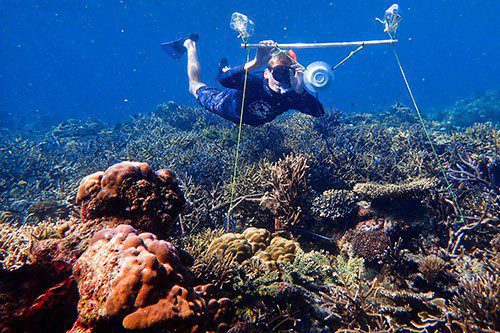DIVING NEWS
Playing golden oldies pulls in fish

Tim Gordon deploys an underwater loudspeaker on a coral reef. (Picture: Harry Harding, University of Bristol)
Broadcasting the sounds of healthy coral reefs in dying ones – that’s the surprising new approach to restoring reefs that’s been proposed following trials by an international team of marine biologists.
Scientists from the UK’s Universities of Exeter and Bristol and Australia’s James Cook University and Australian Institute of Marine Science (AIMS) say that “acoustic enrichment” could prove a valuable tool in helping to restore damaged coral reefs.
In a six-week field experiment, they played audio recordings made on healthy reefs on underwater loudspeakers set in patches of dead coral on Australia’s Great Barrier Reef.
They wanted to see whether they could lure back the fish that are needed to counteract reef degradation – and they reported that twice as many were attracted to, and remained in, the healthy-sounding dead-coral areas than to those left silent. The number of species attracted also increased, by 50%.
“Fish are crucial for coral reefs to function as healthy eco-systems,” said lead author Tim Gordon of the University of Exeter. “Boosting fish populations in this way could help to kickstart natural recovery processes, counteracting the damage we’re seeing on many coral reefs around the world.”
“Healthy coral reefs are remarkably noisy places – the crackle of snapping shrimp and the whoops and grunts of fish combine to form a dazzling biological soundscape,” said senior author Prof Steve Simpson, also from the University of Exeter. “Juvenile fish home in on these sounds when they’re looking for a place to settle.
2 December 2019
“Reefs become ghostly quiet when they are degraded, as the shrimps and fish disappear, but by using loudspeakers to restore this lost soundscape, we can attract young fish back again.”
While attracting fish to a dead reef won’t bring it back to life automatically, “recovery is underpinned by fish that clean the reef and create space for corals to regrow”, explained AIMS fish biologist Dr Mark Meekan.
The increase in fish species attracted was also important because different groups provided a variety of reef-maintenance functions.
“While attracting more fish won’t save coral reefs on its own, new techniques like this give us more tools in the fight to save these precious and vulnerable ecosystems,” said Gordon. “From local management innovations to international political action, we need meaningful progress at all levels to paint a better future for reefs worldwide.”
